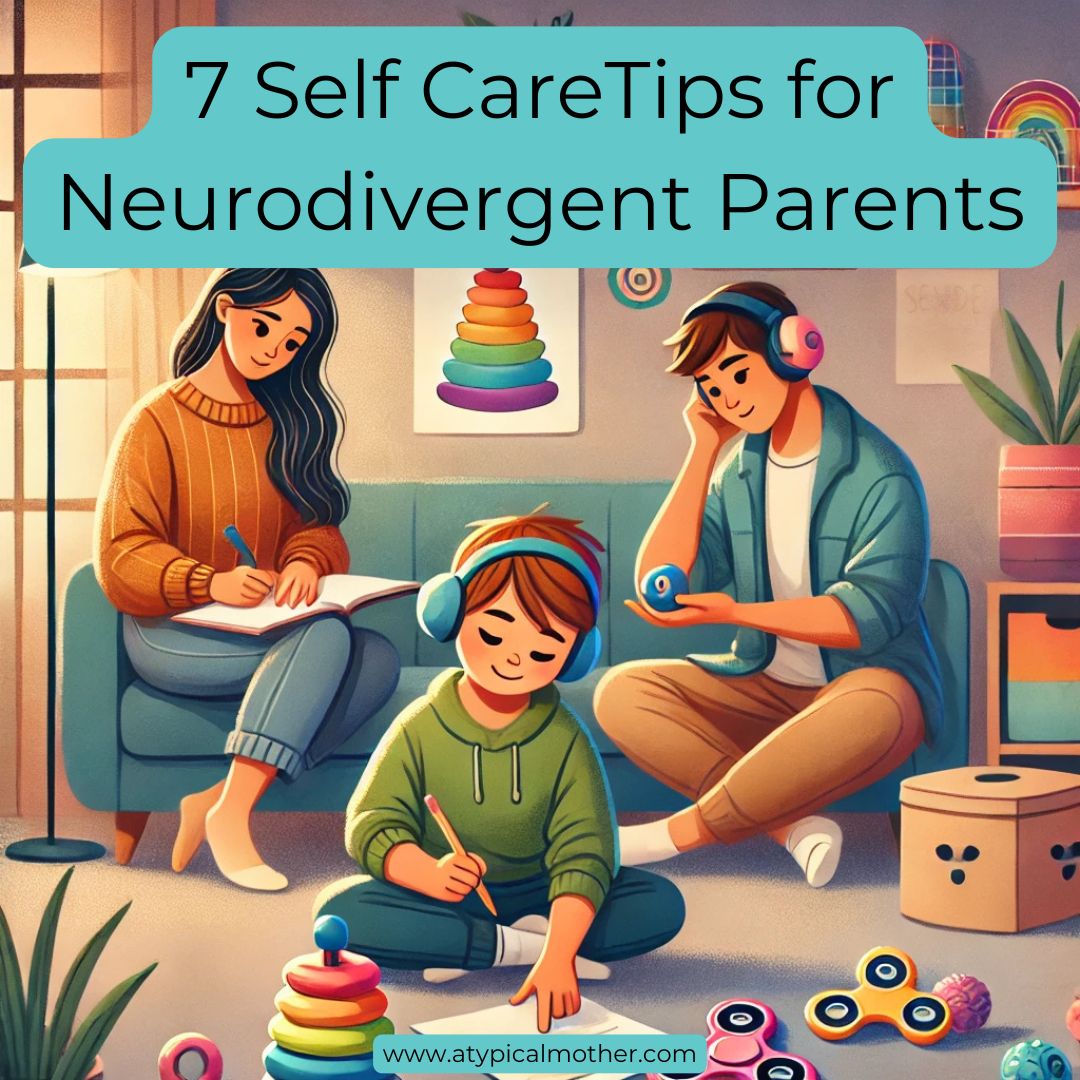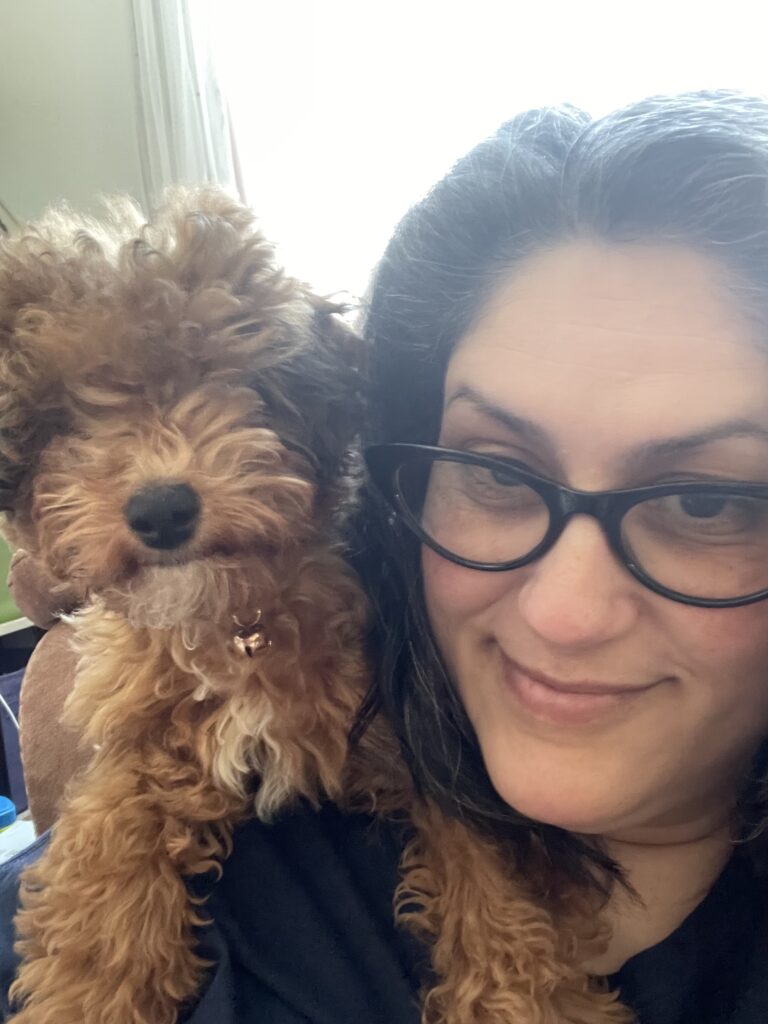As we turn the page on another year, the phrase “New Year, New You” often echoes in advertisements and social media posts. While this sentiment might feel inspiring for some, it can feel overwhelming or unrealistic for others, especially neurodivergent parents balancing their own needs with the demands of parenting. The truth is, self-care doesn’t have to mean a complete transformation; it can mean small, meaningful changes that fit your life and support your well-being.

Here are practical, realistic self-care tips for neurodivergent parents to make 2025 a year of growth, not perfection. After all, perfection doesn’t exist when it comes to humans.
1. Set Intentions, Not Resolutions
Resolutions often feel rigid and unforgiving, especially when life gets messy. Instead, focus on intentions that align with your values and needs. For example:
- Intention: “I want to prioritize rest when I’m feeling overwhelmed.”
- Resolution: “I will get eight hours of sleep every night.”
⠀Intentions allow for flexibility, making them more sustainable. Write them down or create a visual reminder, like a simple doodle, sticky note or write it on your bathroom mirror with a dry erase marker.
Self-Care Tip: Use apps or tools designed for neurodivergent individuals to set gentle reminders for your intentions without adding pressure.
2. Redefine Self-Care
For neurodivergent parents, traditional self-care ideas like spa days or bubble baths might not resonate or feel achievable. Instead, think of self-care as anything that reduces stress and increases joy or comfort in your day-to-day life. This could be:
- Asking for help when needed.
- Scheduling quiet time after a noisy day.
- Listening to your favorite music & tuning out the world with noise canceling headphones
- Simplifying meals with prepped ingredients or meal kits.
- Wearing comfy clothes and enjoying your favorite book or video game
⠀Self-Care Tip: Make a list of “micro self-care” activities that take 5-10 minutes, like deep breathing, stretching, or savoring a favorite snack.
3. Lean Into Your Strengths
Neurodivergent brains often come with unique strengths, such as hyperfocus, creativity, and problem-solving skills. Use these strengths to your advantage in your self-care routine. For example:
- Hyperfocus: Dedicate 20 minutes to an activity you love, like a crafting hobby or researching your latest fixation.
- Creativity: Design a colorful planner to organize your week or a daily todo list tracker that works with your lifetsyle.
⠀Self-Care Tip: Celebrate your strengths by incorporating them into your parenting and personal goals. For example, turn organizing the week’s meals into a creative planning session. Even get the kids involved and have them come up with meals to add!
4. Create a “Self-Care First Aid Kit”
Life as a neurodivergent parent can be unpredictable. A “self-care first aid kit” helps you prepare for those challenging moments. This can include:
- Noise-canceling headphones.
- Fidget toys, stress balls or a favorite toy.
- A playlist of calming or energizing songs.
- Favorite snacks or a comforting drink.
- A weighted garment or blanket for that cozy hug feeling
⠀Self-Care Tip: Keep your kit in a convenient spot and encourage your children to create their own self-care kits, fostering independence and emotional regulation.
5. Set Boundaries to Protect Your Energy
Boundaries are an essential part of self-care, especially for neurodivergent parents who may feel drained by social interactions, sensory overload, or endless commitments. Practice saying no or delegating tasks when needed. For instance:
- Decline invitations that feel overwhelming and opt for low-stimulation alternatives. It is ok to say no and prioritize your mental health. Remember that.
- Ask your partner, co-parent, or a friend to share the load on challenging days.
⠀Self-Care Tip: Use scripts to make boundary-setting easier, such as, “Thank you for inviting me, but I’m prioritizing rest this weekend.”
6. Prioritize Connection
While alone time can be restorative, connection is also vital. Seek out relationships with people who understand your experiences as a neurodivergent parent. This could mean:
- Joining a local or online support group.
- Scheduling regular check-ins with a trusted friend.
- Participating in neurodivergent-friendly community events.
⠀Self-Care Tip: If in-person events feel overwhelming, explore virtual communities that provide connection without sensory overload. Connection is the key! No one enjoys feeling like the only raft in the ND Ocean.
7. Be Kind to Yourself (THE BIG ONE)
Perhaps the most important self-care tip is practicing self-compassion. This is one of the hardest things to do. Neurodivergent parents often face unique challenges, and it’s easy to fall into patterns of self-criticism. Remember:
- You are doing the best you can with the tools you have.
- Rest is productive. You can’t take care of yourself and those you care about if you are drained of energy. Make yourself and your family happy by resting. No one enjoys a grumpy person.
- Progress, not perfection, is what counts. I am a different parent now than I was 10 years ago. When you know more, you can see more and do more. Be patient with yourself. We are all a work in progress.
⠀Self-Care Tip: Start a self-compassion journal to reframe negative thoughts into positive affirmations. For example, replace “I’m not doing enough” with “I am doing what I can, and that’s enough.”
Final Thoughts
Self-care as a neurodivergent parent isn’t about doing more; it’s about doing what matters. By setting intentions, leaning into your strengths, and creating space for rest and connection, you can make 2025 a year of sustainable growth and joy. Remember, you’re not alone in this journey, and every step you take toward self-care is a step toward a more balanced and fulfilling life.
Think about how you can use these tips or adapt them to your lifestyle or situation. What are some ways you can self care routines to your day?
Here’s to a kinder, gentler New Year—for you and your family.


